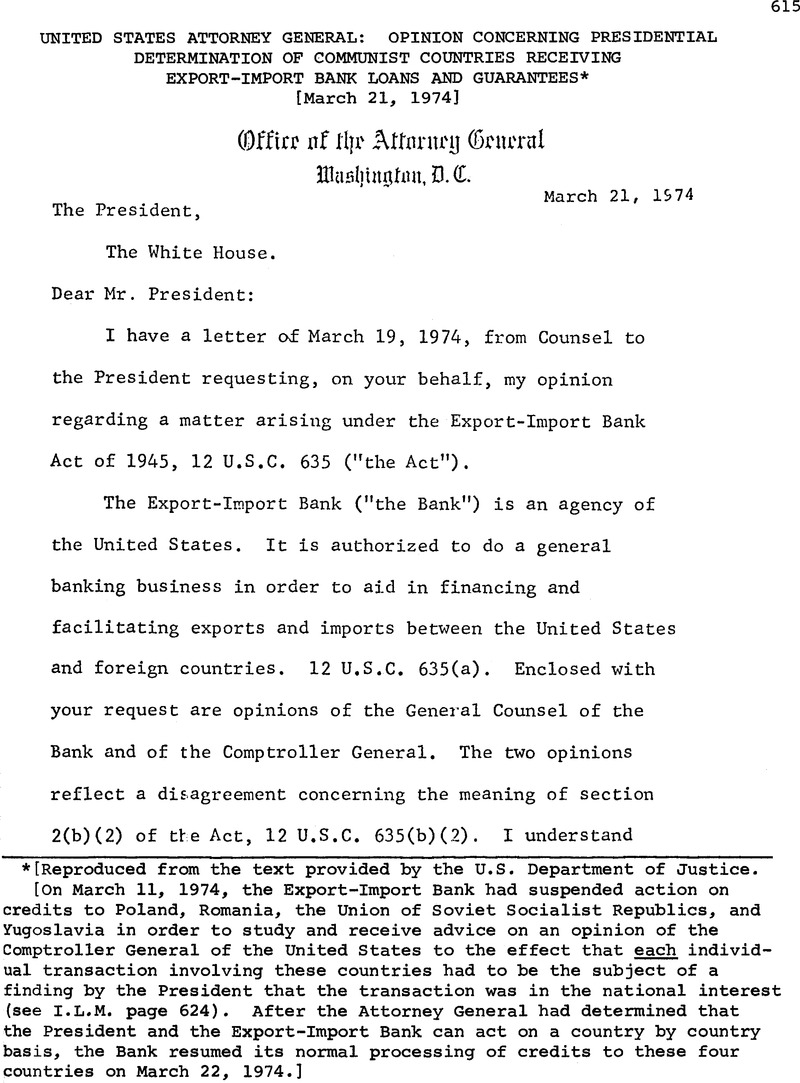Published online by Cambridge University Press: 04 April 2017

[Reproduced from the text provided by the U.S. Department of Justice.
[On March 11, 1974, the Export-Import Bank had suspended action on credits to Poland, Romania, the Union of Soviet Socialist Republics, and Yugoslavia in order to study and receive advice on an opinion of the Comptroller General of the United States to the effect that each individual transaction involving these countries had to be the subject of a finding by the President that the transaction was in the national interest (see I.L.M. page 624). After the Attorney General had determined that the President and the Export-Import Bank can act on a country by country basis, the Bank resumed its normal processing of credits to these four countries on March 22, 1974.]
1 “None of the funds made available because of the provisions of this Title shall be used by the Export-Import Bank to either guarantee the payment of any obligation hereafter incurred by any Communist country (as defined in section 620(f) of the Foreign Assistance Act of 1961, as amended) or any agency or national thereof, or in any other way to participate in the extension of credit to any such country, agency, or national, in connection with the purchase of any product by such country, agency, or national, except when the President determines that such guarantees would be in the national interest and reports each such determination to the House of Representatives and the Senate within 30 days after such determination.” Foreign Aid and Related Agencies Appropriation Act, 1964, approved January 6, 1964, 77 Stat. 857, 863.
2 “The compromise language which we finally developed in the conference report and which has been adopted by the House is a significant and important policy recommendation by Congress and a firm expression of congressional intent. It contains the same specific prohibition against extension and guarantees of credit to the Communist nations contained in S. 2310 but it provides an escape clause to be used by the President of the United States only--and I repeat only--when he himself finds in the case of each proposed credit transaction that he believes it to be in the national interest ***.
***
I am confident there are many in Congress and throughout the country--and I include myself among them--who will want to scrutinize each such transaction most intently and carefully if it should actually eventuate and be authorized.” 109 Cong. Rec. 25618.
3 “Of course, the gentleman realizes that a new determination has to be made with each transaction under the terms of this amendment?” Id. at 25418 (Rep. Rhodes). A comment of Representative Passman is also cited, 109 Cong. Rec. 25417. However, it is not as specific.
4 The statement was not inserted in the record at the place where debate on this particular provision appears in the record. The Senate debate on trade with Communist countries is at 109 Cong. Rec. 25625-28.
5 Eg., 109 Cong. Rec. 25419 (Rep. Ilahon): “The question is whether in the beginning of the period of service of the new President we will give him the flexibility which he has requested in Che handling of foreign affairs. I for one, here in the beginning of his administration, am willing to give him this flexibility. He is able, informed, and experienced and he is going to be answer-able to the American people. The correctness of his decision on these matters can be decided at a later date even perhaps at the ballot: box. We ought not to deny the President the flexibility which he has requested in an area where he has a special consuitutional responsibility.”
6 E.g., H. Rep. No. 92-303, p. 10 (1971); Foreign Assistance and Related Agencies Appropriations for 1969, Hearings before the Subcommittee on Foreign Operations of the House Appropriations Committee, 90th Cong., 2d Sess., Part 1, p. 201:
Mr. Passman. Without any further Presidential determination, you can negotiate loans for other commodities; can you not?
Mr. Lindor. With that particular country; yes.